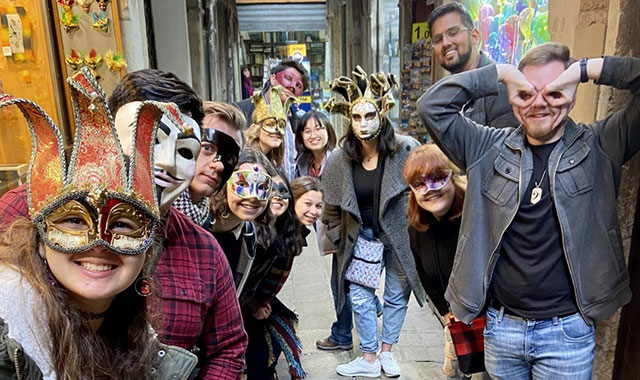Political Geography & History
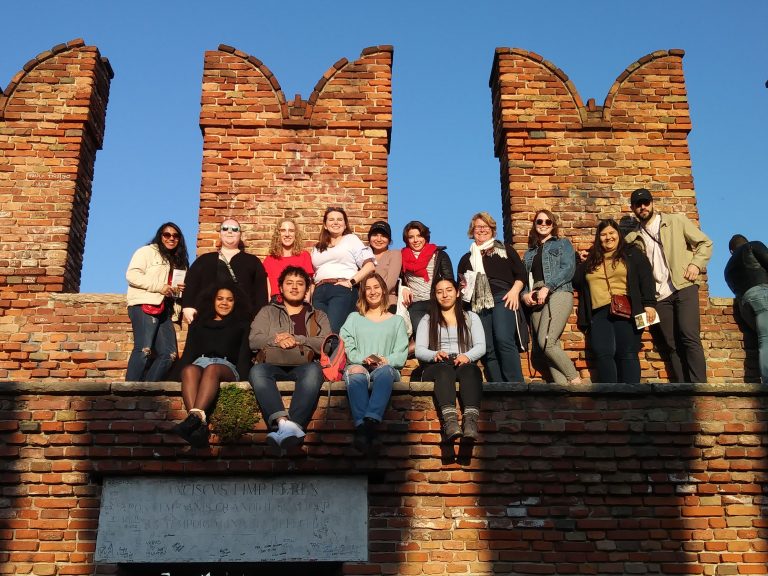 Unlike many study abroad programs, which involve registrations at foreign institutions and administrative hurdles to transfer courses, the COLFA Semester in Urbino offers UTSA courses taught by UTSA faculty or by University of Urbino faculty who have been vetted and approved by UTSA. The courses have been carefully selected to fit into UTSA degree plans and will appear seamlessly in ASAP. Moreover, since you will remain a full-time UTSA student during your semester abroad you will have access to UTSA services such as financial aid and library resources and will not encounter difficulties with minimum credit-hour requirements for financial aid or scholarships.
Unlike many study abroad programs, which involve registrations at foreign institutions and administrative hurdles to transfer courses, the COLFA Semester in Urbino offers UTSA courses taught by UTSA faculty or by University of Urbino faculty who have been vetted and approved by UTSA. The courses have been carefully selected to fit into UTSA degree plans and will appear seamlessly in ASAP. Moreover, since you will remain a full-time UTSA student during your semester abroad you will have access to UTSA services such as financial aid and library resources and will not encounter difficulties with minimum credit-hour requirements for financial aid or scholarships.
Supplemental art and cooking classes are also available during the semester.
Important Dates for Fall 2025
See some of the important events and trips scheduled for the semester. Many of the details are still being finalized, so some dates and trip destinations may vary. A printable schedule of class meeting times and excursion dates is also available.
| February 28 | Commitment fee of $1000 due by 4:00 pm (see the Fall 2024 Canvas Organization for payment instructions) |
|---|---|
| March 30 | Balance of first payment of $1750 due by 4:00 pm |
| August 28 | Arrival in Rome at Leonardo da Vinci International Airport (FCO) no later than 1:00 pm; charter bus to Urbino departs promptly from the airport at 2:00. Anticipated arrival in Urbino at 6:30 pm. |
| August 29 | 9:00: GEV orientation. GEV will collect a deposit (€100 or $100) that will be returned at the end of the program if there are no damages to the classrooms or dorms. 13:00: welcome lunch 14:00 tour of Urbino with Roberta |
| September 1 | classes begin |
| September 4 | 9:00: Organic Farm Tour 13:00: Welcome Lunch |
| September 5 | 9:00 Departure by public bus for guided tour of Pesaro |
| September 6 | 9:00 Historical Tour of Urbino 11:00 Palazzo Ducale Tour |
| September 11 | 8:00 Departure for day trip to Bologna |
| September 18-21 | Extended excursion: Rome |
| September 25 | 7:30 Departure for day trip to Ravenna |
| October 2-5 | Extended excursion: Venice |
| October 6-12 | Fall break |
| October 16 | 8:00 Departure for day trip to Rimini |
| October 23-26 | Extended excurtion: Siena and Florence |
| October 30 | 8:00 Departure for day trip Assisi/Perugia (the UTSA group will be split with one group going to Perugia and another group going to Assisi. The groups will visit the alternate cities on November 7) |
| November 7 | 8:00 Departure for day trip to Perugia/Assisi |
| November 6-8 | Optional Mini-Excursion to Pompeii |
| November 11 | Final exams and presentations |
| November 13 | Day Trip to Perugia |
| November 21 | Farewell Dinner |
| November 24 | Studio cleaning and check-out Dorm check-out |
| November 25 | 5:00 Bus to Rome Airport for return to US. All students must fly home on this day |
Course Information
The following 16 credit hours of courses are offered during the Fall 2024 semester.
The focus on Anthropology will be especially relevant to students in the Medical Humanities, History, History, Museum Studies, and Psychology programs. Graduate versions of these courses are also available. If you are a graduate student interested in the COLFA Semester in Urbino, please contact us for more information.
| GES/POL/GLA 4853.1 | Political Geography |
|---|---|
| GES/POL/GLA 4853.2 | Space & Identity-Crises in the Post-Modern Era |
| HIS 4953 |
Special Studies in History: History & Culture of Italy
|
| AHC 4333 | Medieval and Renaissance Art History |
| FL 1034 | Elementary Italian (do not enroll: course will transfer) |
Course Descriptions
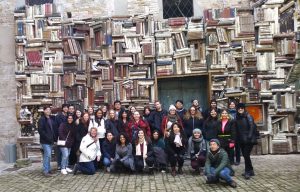
GES / POL / GLA 4853.1 Political Geography. This course primarily focuses on the international scale of political geography. It deals with political, economic, and social aspects of international relations from a geographical perspective. As such, the course has an integrative character. By the end of the semester students will have a critical understanding of various conceptions of the state, "World Orders", and the strategies and mechanisms that define them. The course begins with an examination of the territorial state, its origins, and its apparent trajectory. The course then proceeds to a detailed examination of the nature of power in the modern world system based on the premise that examination of the solitary state is an ineffective approach to reveal and comprehend politic processes, both nationally and internationally. It is the role of the state in the world economy that largely determines how it politically behaves. The course will conclude with a geographical examination of miscellaneous international issues and practices of the various states that will grow increasingly more challenging in the 21st century.
GES / POL / GLA 4853.2 Space & Identity-Crises in the Post-Modern Era. This course primarily focuses on the challenges of personal and collective identity formation in the industrial and post-industrial eras, processes that have led to an increasing sense of powerlessness and apathy. The objectives of this course are to fundamentally show the relevance of space, media, and the economy in the production and reproduction of these identities and their changing role in society. Given the relevance of identity to social hierarchy, the course strives to show that the identities attached to state, class, ethnicity, race and gender are entirely subject to material incentives by an overlapping kaleidoscope of ‘situationally’ privileged interest groups.
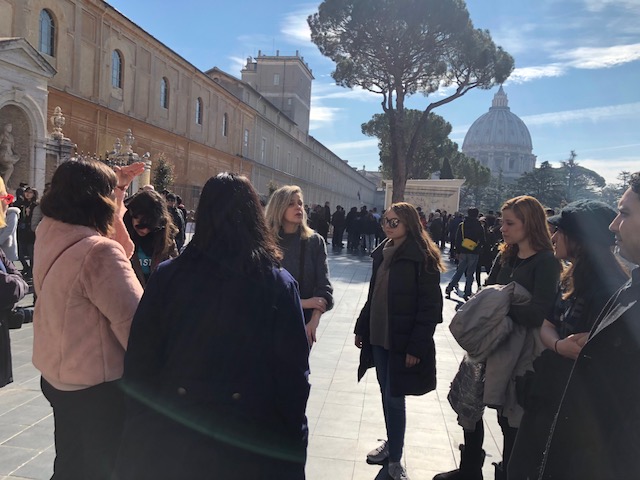 HIS 4953 European encounters with China: A deep history since Marco Polo. An exercise in historical imagination through European time and space, this course begins our Italian sojourn by exploring such deep connections of Europe with China first forged centuries ago by the legendary journeys of Marco Polo (from nearby Venice) and the Jesuit missionaries backed by the Vatican court (in Rome). Focusing on the travels undertaken by people, the exchange of everyday commodities, and the circulation of ideas, we then follow the footprints of Chinese travelers to industrializing England, reconstruct the ill-fated journeys of several thousand Chinese laborers who perished in wartime France during World War I, and relive the political baptism of some first-generation Chinese Communists in Marxism while enrolled in work-study program in Western Europe in the early 20th century. The final destination will return us to Italy with a field study of contemporary Chinese immigrants along the latest frontiers of the Chinese diaspora.
HIS 4953 European encounters with China: A deep history since Marco Polo. An exercise in historical imagination through European time and space, this course begins our Italian sojourn by exploring such deep connections of Europe with China first forged centuries ago by the legendary journeys of Marco Polo (from nearby Venice) and the Jesuit missionaries backed by the Vatican court (in Rome). Focusing on the travels undertaken by people, the exchange of everyday commodities, and the circulation of ideas, we then follow the footprints of Chinese travelers to industrializing England, reconstruct the ill-fated journeys of several thousand Chinese laborers who perished in wartime France during World War I, and relive the political baptism of some first-generation Chinese Communists in Marxism while enrolled in work-study program in Western Europe in the early 20th century. The final destination will return us to Italy with a field study of contemporary Chinese immigrants along the latest frontiers of the Chinese diaspora.
HIS 4953 Special Studies in History: History & Culture of Italy. In this course we will investigate several aspects of Medieval and Renaissance Art that took place in Italy during the 13th-16th centuries. We will begin with a short examination of the transition from Greek-Roman Art to the Art of the Middle Ages and the transition from Medieval Art (with a focus on gothic or proto-Renaissance art) to Renaissance Art, in order to be able to make critical comparisons between artworks from different ages. We will focus on architecture, sculpture and painting with an emphasis on monuments and works of art which students will see during the semester.
FL 1034. Beginning Language Study Abroad. Opportunity to begin developing oral and written communication skills in the target language, along with enhanced comprehension skills in listening and reading. Linguistic and cultural immersion. May be repeated up to 8 semester credit hours in each language.
Fall 2025 Faculty
 Dr. Miguel de Oliver, Associate Professor of Geography (Ph.D., Pennsylvania State University) has been at UTSA since 1992. Much of Dr. de Oliver's research centers upon demographic disparities in the postmodern urban landscape. A particular interest has been consumerism and the manifestations of racial/ethnic inequality in the North American built environment. Spanning from 2001 to the present, articles such as "Multicultural Consumerism and Racial Hierarchy: A Case Study of Market Culture and the Structural Harmonisation of Contradictory Doctrines" (Antipode, 2001) and “Gentrification as the Appropriation of Therapeutic ‘Diversity” (Urban Studies, 2016) typify this theme. The contrasting experience and practice of ‘social distancing’ by increasingly alienated urban/suburban, as well as race/ethnic, demographics is contextualized by such publications as “Utilizing the metanarrative of ‘suburbia’ as a common axis for the racial diversity of middle class reurbanization projects” (Urban Affairs Review, 2017). His present research highlights the increasingly problematic relationship between race, disparity, and alienation.
Dr. Miguel de Oliver, Associate Professor of Geography (Ph.D., Pennsylvania State University) has been at UTSA since 1992. Much of Dr. de Oliver's research centers upon demographic disparities in the postmodern urban landscape. A particular interest has been consumerism and the manifestations of racial/ethnic inequality in the North American built environment. Spanning from 2001 to the present, articles such as "Multicultural Consumerism and Racial Hierarchy: A Case Study of Market Culture and the Structural Harmonisation of Contradictory Doctrines" (Antipode, 2001) and “Gentrification as the Appropriation of Therapeutic ‘Diversity” (Urban Studies, 2016) typify this theme. The contrasting experience and practice of ‘social distancing’ by increasingly alienated urban/suburban, as well as race/ethnic, demographics is contextualized by such publications as “Utilizing the metanarrative of ‘suburbia’ as a common axis for the racial diversity of middle class reurbanization projects” (Urban Affairs Review, 2017). His present research highlights the increasingly problematic relationship between race, disparity, and alienation.
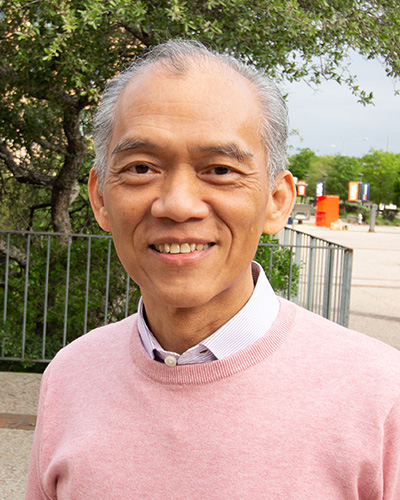 Dr. Wing Chung Ng earned his B.A. and M.Phil. from the University of Hong Kong where he acquired a strong interest on Asia-Europe inter-cultural encounters since the early modern times. He attended the University of British Columbia to earn his Ph.D. specializing on modern China with a focus on transnational mobility, identity formation, and community politics in the context of diaspora. His most recent work delves into traditional Chinese music theater/opera, its consumption as entertainment and cultural markers, and its global circuitry. A former Commonwealth Scholar, a fellow at the National Humanities Center, and a Fulbright Scholar, Ng teaches courses on China and East Asia at UTSA with an emphasis on social and cultural history, and deciphering the long arc of Chinese globalization over the past three centuries.
Dr. Wing Chung Ng earned his B.A. and M.Phil. from the University of Hong Kong where he acquired a strong interest on Asia-Europe inter-cultural encounters since the early modern times. He attended the University of British Columbia to earn his Ph.D. specializing on modern China with a focus on transnational mobility, identity formation, and community politics in the context of diaspora. His most recent work delves into traditional Chinese music theater/opera, its consumption as entertainment and cultural markers, and its global circuitry. A former Commonwealth Scholar, a fellow at the National Humanities Center, and a Fulbright Scholar, Ng teaches courses on China and East Asia at UTSA with an emphasis on social and cultural history, and deciphering the long arc of Chinese globalization over the past three centuries.
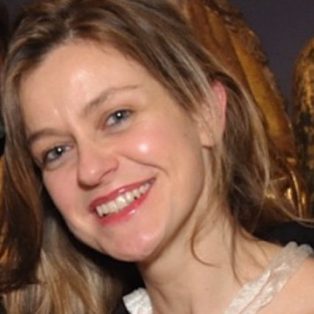 Dr. Grazia Fachechi is an Associate Professor of Art History at the University of Urbino, Department of Humanities, where she has taught undergraduate and graduate students for more than twenty years. She received her Bachelor and Master degrees in Urbino and did post-graduate work in other cities: Florence (certificate in Museology and Art Criticism at the International University of Art – UIA), Perugia (PhD in Art History at the University of Perugia) and Rome (Diploma of Specialization in Medieval and Modern Art History at Sapienza University). She currently lives in Rome.
Dr. Grazia Fachechi is an Associate Professor of Art History at the University of Urbino, Department of Humanities, where she has taught undergraduate and graduate students for more than twenty years. She received her Bachelor and Master degrees in Urbino and did post-graduate work in other cities: Florence (certificate in Museology and Art Criticism at the International University of Art – UIA), Perugia (PhD in Art History at the University of Perugia) and Rome (Diploma of Specialization in Medieval and Modern Art History at Sapienza University). She currently lives in Rome.
 The Italian language courses are taught by certified instructors at Lingua Ideale Urbino working under the auspices of the University of Urbino “Carlo Bo”. Lingua Ideale is a professional language school offering courses of Italian language and culture to foreigners. The curriculum for the COLFA Semester in Urbino has been designed to meet the requirements of the foreign language courses at UTSA while also incorporating local aspects of Italian culture.
The Italian language courses are taught by certified instructors at Lingua Ideale Urbino working under the auspices of the University of Urbino “Carlo Bo”. Lingua Ideale is a professional language school offering courses of Italian language and culture to foreigners. The curriculum for the COLFA Semester in Urbino has been designed to meet the requirements of the foreign language courses at UTSA while also incorporating local aspects of Italian culture.

